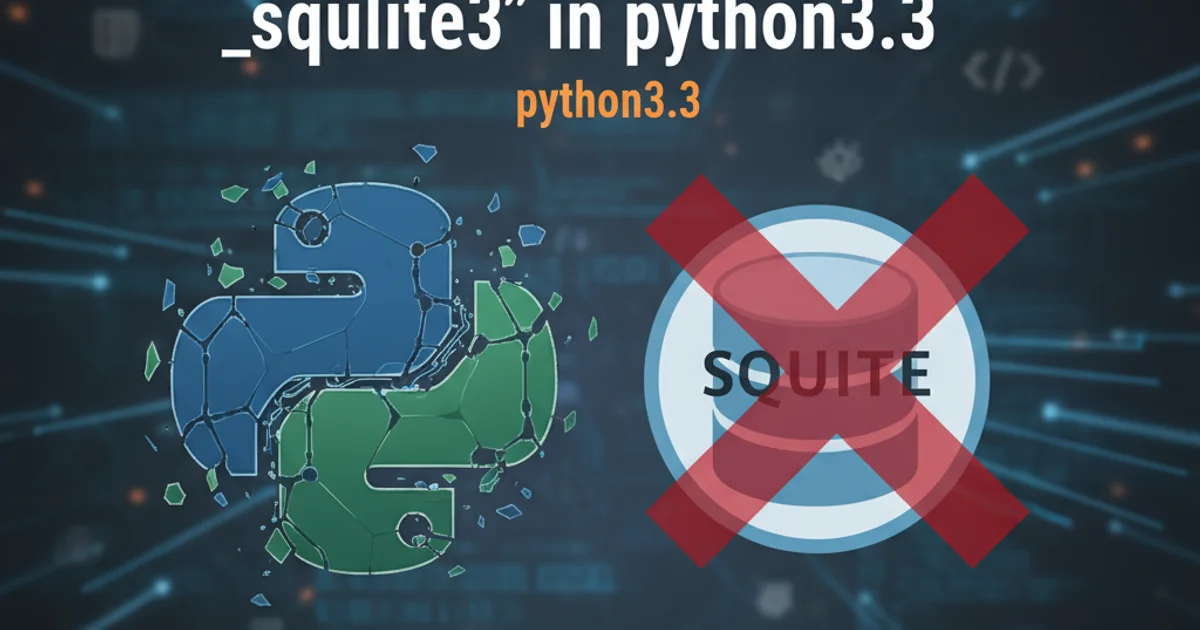sklearn OMP: Error #15 ("Initializing libiomp5md.dll, but found mk2iomp5md.dll already initialize...
Categories:
Resolving libiomp5md.dll Conflicts in Scikit-learn with Intel MKL

Understand and fix the common 'Initializing libiomp5md.dll, but found mk2iomp5md.dll already initialized.' error when using scikit-learn with Intel MKL.
When working with scikit-learn (sklearn) in Python, especially in environments that leverage Intel's Math Kernel Library (MKL) for optimized numerical computations, you might encounter a cryptic error message: OMP: Error #15: Initializing libiomp5md.dll, but found mk2iomp5md.dll already initialized. This error indicates a conflict in how different components of your software stack are trying to initialize OpenMP (Open Multi-Processing) runtime libraries, specifically those provided by Intel. This article will delve into the root cause of this issue and provide practical solutions to resolve it, ensuring your machine learning models fit without interruption.
Understanding the OMP: Error #15 Conflict
The OMP: Error #15 message signals a clash between multiple versions or instances of Intel's OpenMP runtime library being loaded into the same process. This typically happens when different Python packages or underlying C/Fortran libraries, all compiled with Intel MKL, attempt to initialize their own copy of the OpenMP runtime. libiomp5md.dll and mk2iomp5md.dll are both Intel OpenMP dynamic link libraries. The error means one has already been loaded, and another component is trying to load a different (or even the same) one, leading to an unstable state or crash.
This issue is particularly prevalent in environments like Anaconda or Enthought Canopy, which often pre-package optimized scientific libraries that rely heavily on MKL. When scikit-learn (or its dependencies like numpy or scipy) is installed, it might pull in its own MKL-optimized binaries, leading to the conflict if another library has already initialized a different MKL/OpenMP version.
flowchart TD
A[Python Script Start]
B{Load Library 1 (e.g., NumPy)}
C{Load Library 2 (e.g., Scikit-learn)}
D[Library 1 Initializes OpenMP (libiomp5md.dll)]
E[Library 2 Attempts to Initialize OpenMP (mk2iomp5md.dll)]
F[OMP: Error #15 Triggered]
A --> B
B --> D
D --> C
C --> E
E --> FFlowchart illustrating the OMP: Error #15 conflict scenario.
Common Causes and Affected Environments
The primary cause is the presence of multiple MKL-linked libraries in your Python environment. This can stem from:
- Multiple Installations: Having
numpy,scipy, orscikit-learninstalled from different sources (e.g.,pipandconda, or differentcondachannels) can lead to conflicting MKL versions. - Environment Managers: While
condagenerally manages dependencies well, specific channel configurations or manual installations can override its safeguards. - Pre-packaged Distributions: Environments like Enthought Canopy often come with their own MKL-optimized libraries, which might clash with
pip-installed packages. - Intel Distribution for Python: If you've explicitly installed Intel's optimized Python distribution, it might introduce its own MKL versions that conflict with other packages.
conda exclusively or pip exclusively within a virtual environment) to minimize dependency conflicts, especially with performance-critical libraries like those relying on MKL.Solutions to Resolve the Conflict
There are several strategies to address the OMP: Error #15 issue. The most effective approach often depends on your specific environment and how your packages were installed.
1. Solution 1: Set KMP_DUPLICATE_LIB_OK Environment Variable
This is often the quickest and easiest fix. The KMP_DUPLICATE_LIB_OK environment variable tells the Intel OpenMP runtime to tolerate multiple copies of the library being loaded. While it's a workaround rather than a true fix for the underlying conflict, it often resolves the error without noticeable side effects for most users.
For Windows:
Open Command Prompt as Administrator and run:
set KMP_DUPLICATE_LIB_OK=TRUE
Or, set it permanently via System Properties -> Environment Variables.
For Linux/macOS:
export KMP_DUPLICATE_LIB_OK=TRUE
Add this line to your ~/.bashrc, ~/.zshrc, or ~/.profile for permanent effect.
Within Python (for testing or temporary fix):
2. Solution 2: Reinstall MKL-dependent Packages
A cleaner solution involves ensuring that all your MKL-dependent packages (like numpy, scipy, scikit-learn) are installed from a consistent source, ideally one that manages MKL dependencies properly (e.g., conda-forge channel for conda).
Using conda (recommended for Anaconda/Miniconda users):
First, try to update your MKL-related packages:
conda update numpy scipy scikit-learn mkl mkl-service
If that doesn't work, try a fresh reinstall in a new environment:
conda create -n myenv python=3.9 numpy scipy scikit-learn mkl-service -c conda-forge
conda activate myenv
Using pip (in a virtual environment):
If you're primarily using pip, ensure you're in a virtual environment. You might need to uninstall and reinstall:
pip uninstall numpy scipy scikit-learn mkl mkl-service
pip install numpy scipy scikit-learn
pip install mkl mkl-service (if explicitly needed, though numpy often pulls it in).
3. Solution 3: Downgrade scikit-learn or numpy
In some rare cases, a specific version of scikit-learn or numpy might have an incompatibility with your system's MKL setup. Downgrading to a slightly older, stable version can sometimes resolve the issue.
Using conda:
conda install scikit-learn=0.23 numpy=1.19 (adjust versions as needed)
Using pip:
pip install scikit-learn==0.23.2 numpy==1.19.5 (adjust versions as needed)
4. Solution 4: Check for mk2iomp5md.dll in PATH
Sometimes, mk2iomp5md.dll might be present in your system's PATH environment variable due to other software installations. If you can identify the source of mk2iomp5md.dll and it's not essential for your current Python environment, consider temporarily removing its directory from PATH or renaming the DLL for testing purposes (use caution).
For Windows:
Check your system's PATH environment variable for directories containing mk2iomp5md.dll.
import os
os.environ['KMP_DUPLICATE_LIB_OK'] = 'TRUE'
import numpy as np
from sklearn.linear_model import LogisticRegression
# Your scikit-learn code here
X = np.array([[1, 2], [2, 3], [3, 4], [4, 5]])
y = np.array([0, 0, 1, 1])
model = LogisticRegression()
model.fit(X, y)
print("Model fitted successfully!")
Setting KMP_DUPLICATE_LIB_OK within a Python script.
KMP_DUPLICATE_LIB_OK=TRUE is a common fix, it's a workaround. The ideal solution is to have a consistent MKL environment. If you encounter unexpected behavior or performance issues after setting this, investigate further into your MKL dependencies.